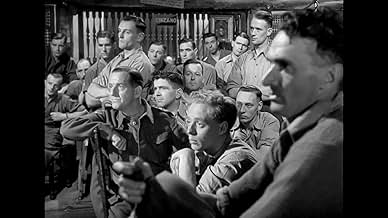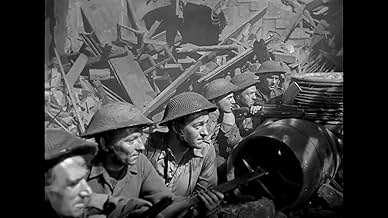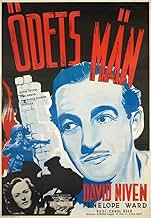CALIFICACIÓN DE IMDb
6.9/10
2.4 k
TU CALIFICACIÓN
Agrega una trama en tu idiomaWorld War II drama that follows a group of British draftees, starting with their rigorous basic training, and ending with their deployment in North Africa.World War II drama that follows a group of British draftees, starting with their rigorous basic training, and ending with their deployment in North Africa.World War II drama that follows a group of British draftees, starting with their rigorous basic training, and ending with their deployment in North Africa.
- Dirección
- Guionistas
- Elenco
- Premios
- 1 premio ganado en total
Hugh Burden
- Pte. Bill Parsons
- (as Hugh Burdon)
Jimmy Hanley
- Pte. Geoffrey Stainer
- (as Jimmie Hanley)
William Hartnell
- Sgt. Ned Fletcher
- (as Billy Hartnell)
A. Bromley Davenport
- Chelsea Pensioner
- (as Bromley Davenport)
Renée Asherson
- Marjorie Gillingham
- (as Renee Ascherson)
Opiniones destacadas
(Minor Spoilers) One of the very best war movies to be made while WWII was still in progress with almost no hint of propaganda and false or movie-like heroism on the part of the good guys a squad,not battalion, of British Tommies in the North African desert. Released in London on June 6, 1944 D-Day, the film was released in the USA a year later as "The Immortal Battalion, "The Way Ahead" couldn't have come at a better time with the Allies and Nazis in a life and death struggle on the beaches of Normandy.
The movie starts off with a number of British recruits well into their 20's or even early 30's getting the hang of military life which at first they greatly, like their first sergeant Ned Fletcher(William Hertwell), dislike. As the trooper are whipped into shape by the though as nails Sgt. Fletcher and their commanding officer the soft spoken Let. Jim Perry, Davd Niven, their slated to sail to French North Africa to participate in the invasion, in Operation Torch, of Vichy France's colonies Algeria and Tunisia. As things turn out the troop ship that their in gets struck by a German U-boat torpedo and sinks, with half the battalion lost, in the Mediterranean Sea.
With Let.Perry's unite now reduced to company size it's sent to Gibraltar for what seems like the remainder of the war. It's not until the battle of El Alamein starts to turn against the British Eight Army that Let. Perry's men are immediately sent to the front lines to stop the German Afrika's Corps advance. We , as well as Perry's men, finally get to see action as Let. Perry's men are outflanked and cut off by the advancing German troops as the battle of El Alamein rages on behind their backs.
Fghting for their very lives and almost out of ammunition the trapped and outnumbered British troops at the end of the movie tack on their bayonets and walk out of the safety of their barricaded and fixed position, the Rispoli Café, to confront the heavily armed Germans. And at the same time walk into the pages of history in both courage and valor under fire.
You just can't keep from holding back your tears in watching the movie knowing that almost all the cast will eventually end up killed or captured. The movie both didn't overemphasize the British Troops as well as downplay Rommell's Africa Corps. Both parties came across equally brave and effective in the fighting that takes pace in the film. Which is very rare in war movies were one side, the one who makes the film, is shown vastly superior morally as well as militarily over the other: The one that the side who made the movie is at war with.
P.S Look for both Actor Peter Ustinov as café owner Rispoli and Trevor Howard as the troop ships, that goes under the waves, officer in the movie.
The movie starts off with a number of British recruits well into their 20's or even early 30's getting the hang of military life which at first they greatly, like their first sergeant Ned Fletcher(William Hertwell), dislike. As the trooper are whipped into shape by the though as nails Sgt. Fletcher and their commanding officer the soft spoken Let. Jim Perry, Davd Niven, their slated to sail to French North Africa to participate in the invasion, in Operation Torch, of Vichy France's colonies Algeria and Tunisia. As things turn out the troop ship that their in gets struck by a German U-boat torpedo and sinks, with half the battalion lost, in the Mediterranean Sea.
With Let.Perry's unite now reduced to company size it's sent to Gibraltar for what seems like the remainder of the war. It's not until the battle of El Alamein starts to turn against the British Eight Army that Let. Perry's men are immediately sent to the front lines to stop the German Afrika's Corps advance. We , as well as Perry's men, finally get to see action as Let. Perry's men are outflanked and cut off by the advancing German troops as the battle of El Alamein rages on behind their backs.
Fghting for their very lives and almost out of ammunition the trapped and outnumbered British troops at the end of the movie tack on their bayonets and walk out of the safety of their barricaded and fixed position, the Rispoli Café, to confront the heavily armed Germans. And at the same time walk into the pages of history in both courage and valor under fire.
You just can't keep from holding back your tears in watching the movie knowing that almost all the cast will eventually end up killed or captured. The movie both didn't overemphasize the British Troops as well as downplay Rommell's Africa Corps. Both parties came across equally brave and effective in the fighting that takes pace in the film. Which is very rare in war movies were one side, the one who makes the film, is shown vastly superior morally as well as militarily over the other: The one that the side who made the movie is at war with.
P.S Look for both Actor Peter Ustinov as café owner Rispoli and Trevor Howard as the troop ships, that goes under the waves, officer in the movie.
THE WAY AHEAD is to some extent a cliche-driven movie, but given the timeframe of its production, I feel it portrays very well the mindset of the ordinary citizen of a country under extreme duress, as well as the tribulations of the many regiments being reconstituted as the war progressed seemingly forever. While it is difficult for us to imagine what it must have been like to live under the constant spectre of loss and possible defeat, even some understanding of the way things were for the British in 1944 will permit a casual viewer of THE WAY AHEAD to appreciate its positive message and the call-to-duty which it implies.
When compared against many of the similar American WW2 'propaganda' films, THE WAY AHEAD comes across as a down-to-earth story which I'm sure many could identify with at the time. For us, the 21st-century viewer, this movie is a welcome glimpse of the British perspective back then, unique in both plot and characterization compared to the more common U.S. fare of the period. In addition, it provides the enthusiast with dozens of rare snapshots of the use of unique British Commonwealth WW2 equipment.
When compared against many of the similar American WW2 'propaganda' films, THE WAY AHEAD comes across as a down-to-earth story which I'm sure many could identify with at the time. For us, the 21st-century viewer, this movie is a welcome glimpse of the British perspective back then, unique in both plot and characterization compared to the more common U.S. fare of the period. In addition, it provides the enthusiast with dozens of rare snapshots of the use of unique British Commonwealth WW2 equipment.
A film that despite being made in 1944, avoids sterotyping British Characters. A story about a group of people, from various civilian jobs, who receive their call-up papers. It shows them progressing through their training and entering action in North Africa.
Although it may appear simplistic to divide the work of great artists into three distinct periods, there can be no escaping the fact that this tidy and convenient way of classification actually works for the majority. In the case of the most significant British director of the immediate post World War II years, Carol Reed, the chronological view works surprisingly well. There is the fairly anonymous early period up to "The Way Ahead" of 1944, a glorious middle period from "Odd Man Out" to "Outcast of the Islands" - the subsequent "The Man Between" and "A Kid for Two Farthings", although less successful, belong to this period because of their stylistic affinity - and a third period where Reed reverted to anonymity possibly through the pressures of commercialism - how else to explain works as dull as "The Agony and the Ecstasy" and "The Running Man", which do not even look like Reed films. Certainly none of the other films in the first period compare with the sheer enjoyment and confidence of "The Way Ahead". Here the youngish director flexes his muscles, a little parochially perhaps, before taking centre stage with the great directors of that time, De Sica, Rossellini, Welles and Wyler. Technically the film is astonishingly assured. Every shot is lovingly composed with figures always formally balanced within each frame. The editing is nothing short of brilliant. It is only in retrospect and with the advantage of several showings that one realises that the excitement and immediacy of a scene such as the torpedoing of the troopship are entirely achieved by the skill of montage. In every sense "The Way Ahead" is immeasurably superior to the Lean/Coward naval counterpart "In Which We Serve" which parades class distinctions in a way that is positively nauseous. There is nothing patronising in Reed's presentation of a group of men drawn together by the accident of war. Although they come from different social backgrounds, Reed presents them as conditioned by their varied forms of employment rather than being pigeonholed by class. "The Way Ahead" is that very unusual thing, a completely upbeat war film. I suppose it had to be, given its date - 1944. With the scent of victory about to be achieved it had to be an optimistic morale booster. However it goes very much further than any other I know in presenting a completely sanitised war. Not a single character is killed let alone wounded - and this even after the ship carrying the bulk of the cast is blown to smithereens just seconds after the captain leaves. The film ends with the men attaching bayonets to rifles before marching forward into a desert attack. By now we are conditioned into thinking they will all survive although we will never have a way of really knowing. Not that it matters at this stage. So sit back, relax and enjoy as lovely a war as you are ever likely to experience.
The version of The Way Ahead that I have is one that was edited for the American market and has a narration by US war correspondent Quentin Reynolds. It was his narration that sets the stage for a wartime tribute to the civilians who volunteered for king and country at a time of their nation's greatest peril.
When war in Europe was declared David Niven was one of the British stars in America that went back to serve. Since he had been in the army before taking up acting, he was able to secure a commission. For a good deal of the war he was a training officer and really was drilling the men as we see on Salisbury plain. Some of his time was spent in the commandos in missions to Europe. And he was released to make wartime films Spitfire and The Way Ahead.
The script was written by a 21 year old actor/playwright named Peter Ustinov who has a small role in the film. According to a new biography of Niven in order to secure Ustinov's service, enlisted man Ustinov was attached to officer Niven as his orderly.
A whole lot of faces familiar in the British cinema appeared in The Way Ahead, people like Stanley Holloway, Jimmy Hanley, James Donald, Leo Genn, and Trevor Howard. And it was directed in good style by Carol Reed, one of his earliest films.
One big flaw in the film was that the men who trained with officer Niven and sergeant William Hartnell ended up serving with him in North Africa. Not possible in America and not possible in the UK either. But since the idea was to show camaraderie, I guess that Two Cities Films can be forgiven.
The point of the film and of Quentin Reynolds narration is that in time of peril it is the democracies and not those totalitarian countries with a superman philosophy who have the real strength of character. May it ever be so.
When war in Europe was declared David Niven was one of the British stars in America that went back to serve. Since he had been in the army before taking up acting, he was able to secure a commission. For a good deal of the war he was a training officer and really was drilling the men as we see on Salisbury plain. Some of his time was spent in the commandos in missions to Europe. And he was released to make wartime films Spitfire and The Way Ahead.
The script was written by a 21 year old actor/playwright named Peter Ustinov who has a small role in the film. According to a new biography of Niven in order to secure Ustinov's service, enlisted man Ustinov was attached to officer Niven as his orderly.
A whole lot of faces familiar in the British cinema appeared in The Way Ahead, people like Stanley Holloway, Jimmy Hanley, James Donald, Leo Genn, and Trevor Howard. And it was directed in good style by Carol Reed, one of his earliest films.
One big flaw in the film was that the men who trained with officer Niven and sergeant William Hartnell ended up serving with him in North Africa. Not possible in America and not possible in the UK either. But since the idea was to show camaraderie, I guess that Two Cities Films can be forgiven.
The point of the film and of Quentin Reynolds narration is that in time of peril it is the democracies and not those totalitarian countries with a superman philosophy who have the real strength of character. May it ever be so.
¿Sabías que…?
- TriviaIn the U.K., this was released on D-Day, June 6, 1944.
- ErroresFollowing some energetic army training, Private Bill Parsons is seen sitting on the grass at the top of a cliff, with his colleagues, exhausted. However, the action then cuts to him being helped up the cliff.
- Citas
Pvt. Ted Brewer: Only one good man ever got into Parliament.
Pvt. Herbert Davenport: Oh really? Who?
Pvt. Ted Brewer: Bleedin' Guy Fawkes.
- Créditos curiososThe film ends with THE BEGINNING
- Versiones alternativasThe version seen on American TV under the alternate title "The Immortal Battalion" has been re-edited and extensively cut (from 115 to 91 or 86 minutes) by Ed Fitz with an added preface and epilogue by war correspondent Quentin Reynolds.
- ConexionesEdited into WW II Theater: The Way Ahead (2022)
- Bandas sonorasIf You Were the Only Girl (in the World)
(uncredited)
Written by Nat Ayer
Lyrics by Clifford Grey
Performed by Tessie O'Shea and soldiers
Selecciones populares
Inicia sesión para calificar y agrega a la lista de videos para obtener recomendaciones personalizadas
- How long is The Way Ahead?Con tecnología de Alexa
Detalles
- Tiempo de ejecución
- 1h 55min(115 min)
- Color
- Relación de aspecto
- 1.37 : 1
Contribuir a esta página
Sugiere una edición o agrega el contenido que falta



































